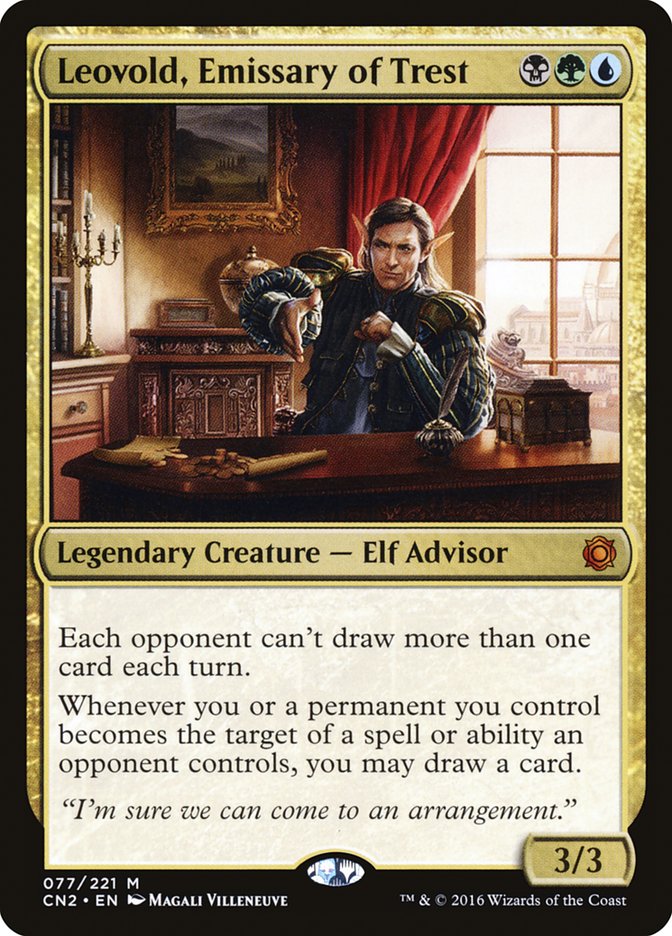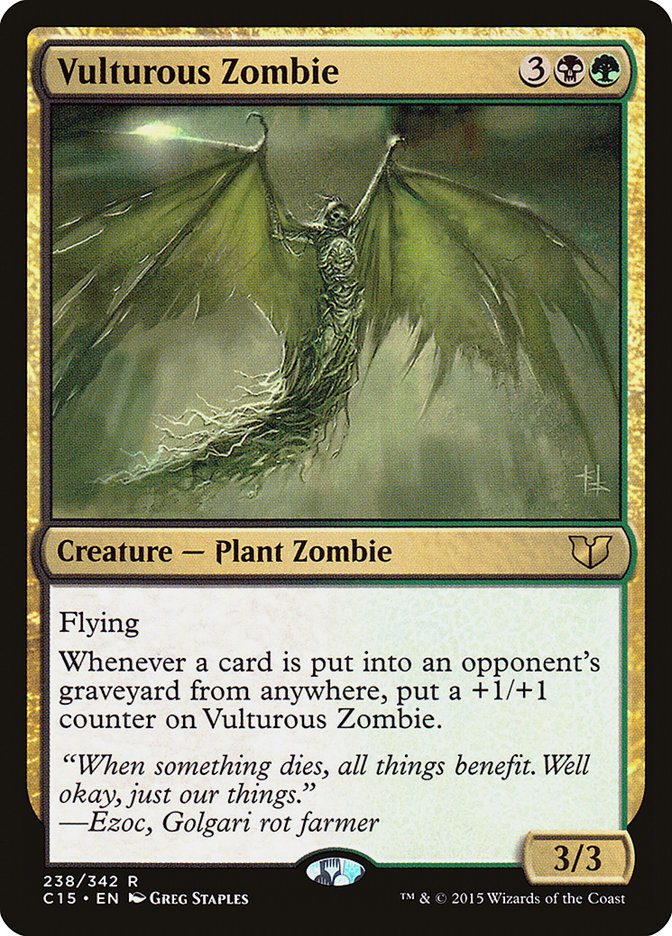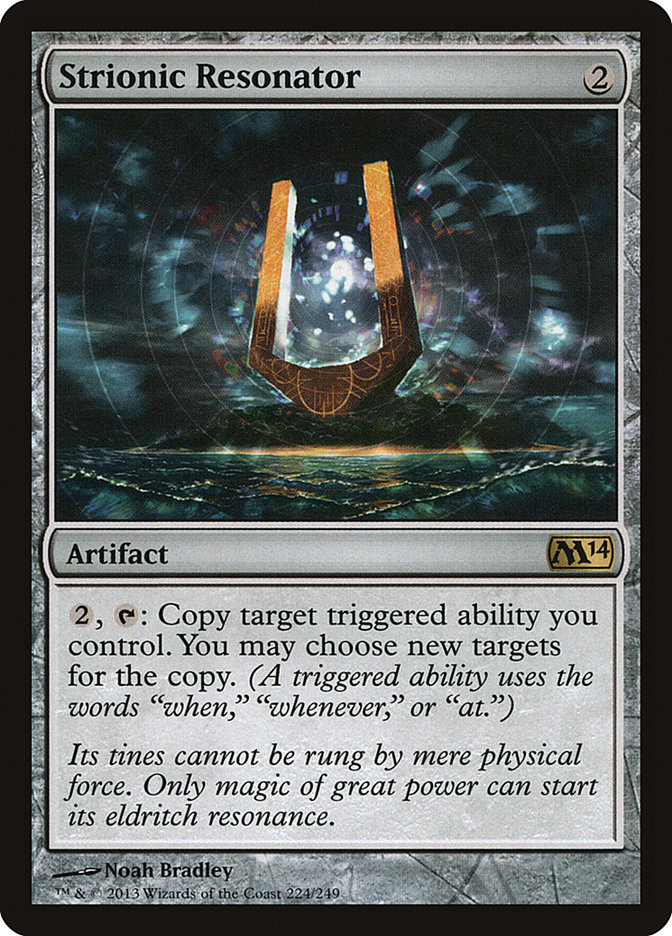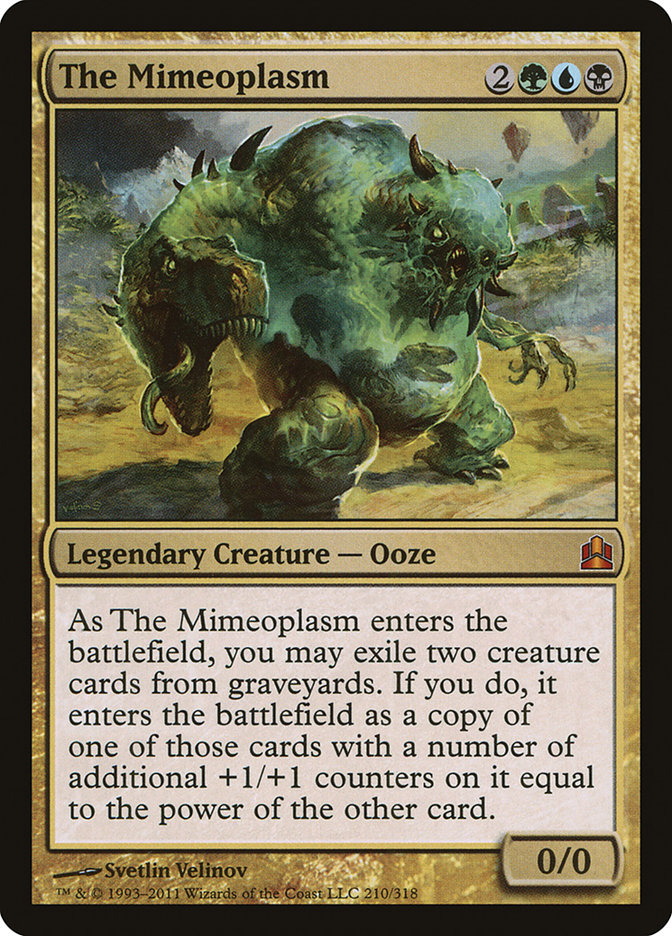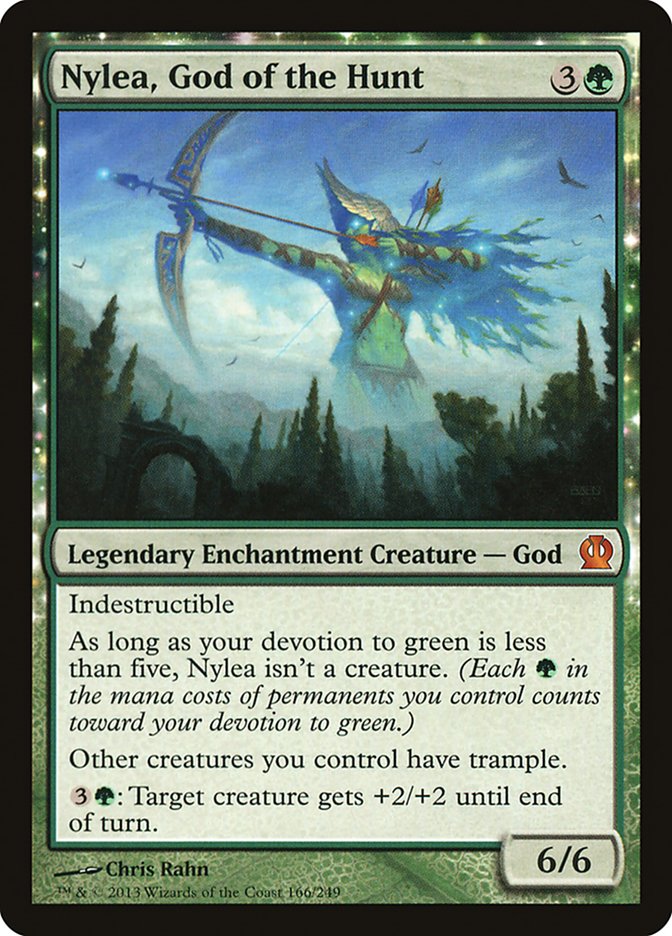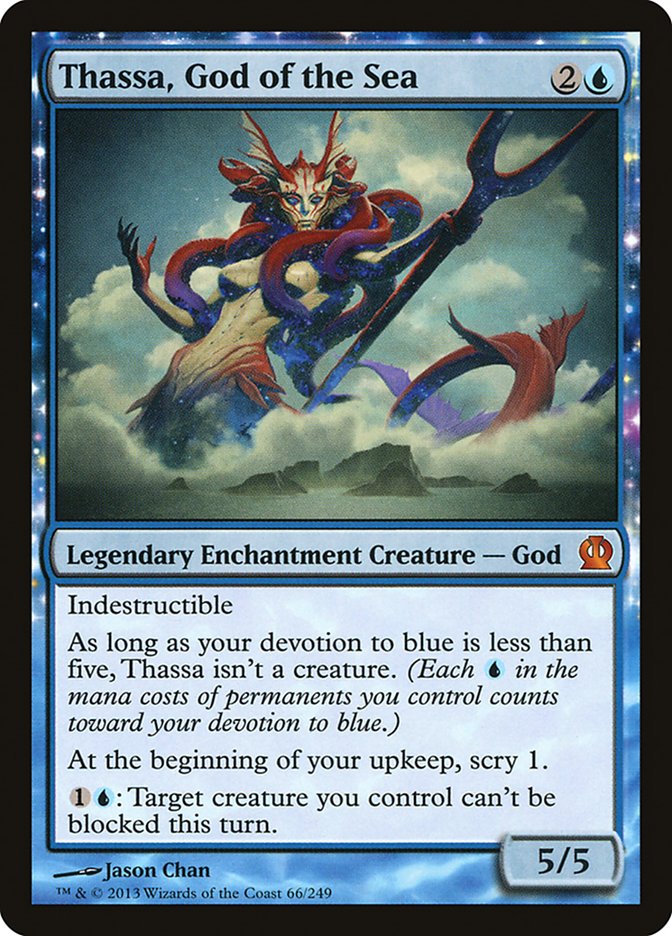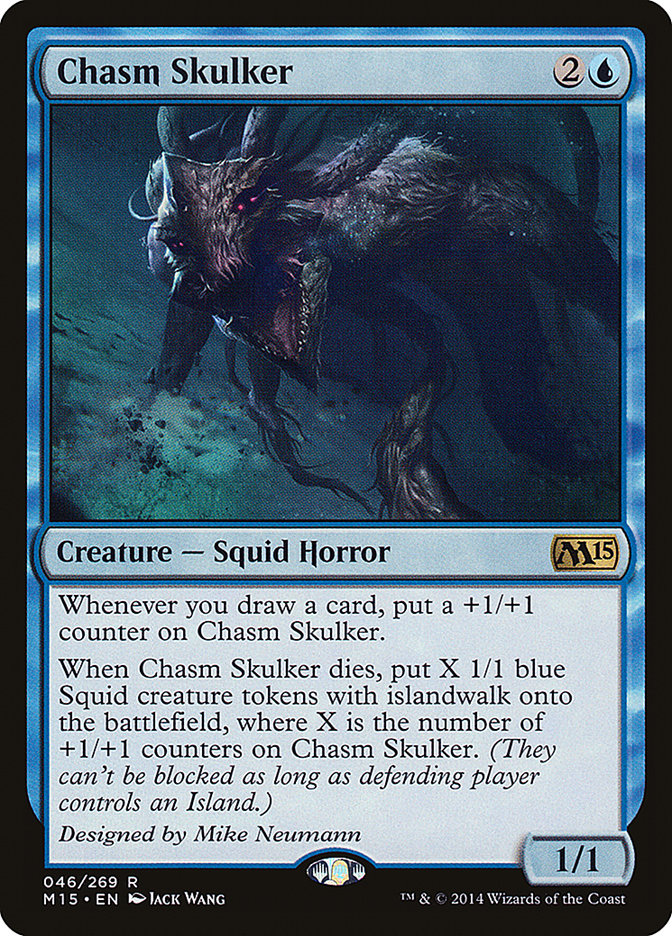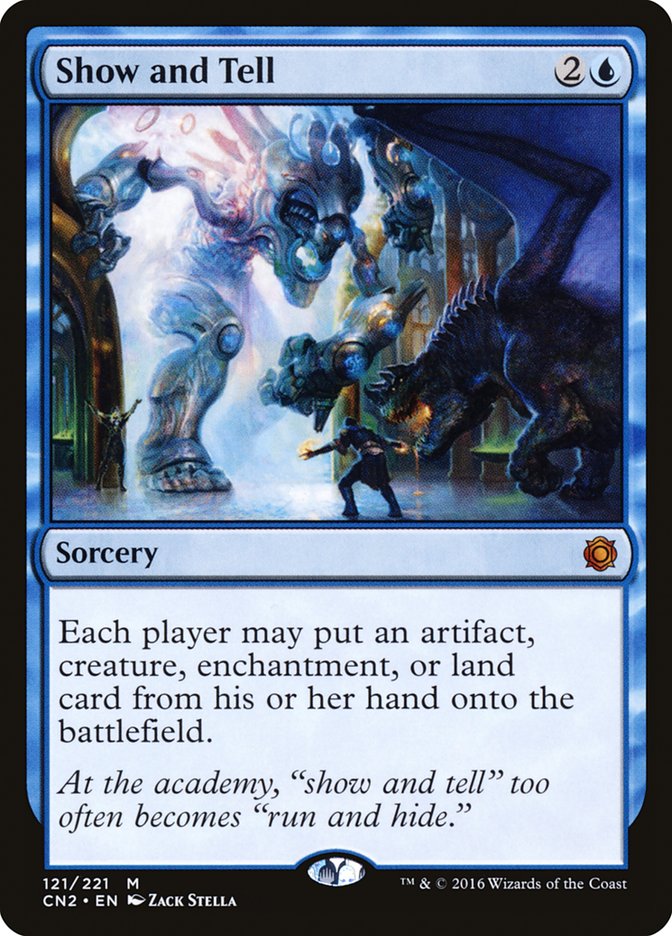The card from Conspiracy: Take the Crown about which I’m most excited is Leovold, Emissary of Trest.
He screams to be built around and he’s in arguably the best the three-color combination for Commander (although regular readers know that I’m partial to Temur). The confluence of the two factors leads me right to building a Leovold deck—with the caveat that it’s not for everyone and it’s a card with which you will want to tread carefully.
I consider myself a reasonably generous person, but when it comes to Commander games, I really have some heartburn with giving my opponents extra cards. It doesn’t matter if that’s with Howling Mine, Jace Beleren, or Mikokoro, Center of the Sea; I don’t want to spend my resources to help you out. In multiplayer games, each opponent getting additional draws has a multiplicative effect—you’re outdrawn three (or four) to one as opposed to keeping pace like you would in a one-on-one game. It’s tough to avoid getting behind with those odds; you’re increasing the chances of at least one of your opponents picking up one of their bomby cards—this is, after all, Commander that we’re talking about. Everybody is playing crazy stuff.
Leovold helps keep the crazy in check.
What’s most relevant to this set is that Leovold shuts down other people being the monarch. When the monarch ability triggers at the end of their turn, they’ve presumably already drawn their card for the turn (in their draw step), so they’re out of luck now. To that extent, it might be worth putting a monarch card or two in any deck which Leovold will lead.
Thinking about putting together a Leovold deck got me thinking about problem-solving as part of deckbuilding process. Regular readers know that I’m a huge fan of theme decks (such as The Battle of Arrakeen and Lazav with the Getaway Face), but we can’t simply build decks in a vacuum. Eventually, we have to actually play them. They have to be both playable and capable of holding their own, which of course is wildly dependent on the group you’re in. I love being in an environment in which I can build the durdliest deck and still at least be in the game. Your mileage will certainly vary.
When I speak of problem solving, I mean problems more specific to the deck which you’re going to build, not the general problems of format and environment. A format-level problem is something like commander damage; you’ll frequently need ways to keep from getting killed by someone else’s commander despite your life total. An environment-level difficulty is what many people call the metagame. In your local group, that one person always plays a Nekusar, the Mindrazer deck, or another plays Mirror Strike in everything they build (I confess that like that latter person already). Problem-solving involves the issues which your deck will create for you—like having very little enchantment removal in U/B or creature control in mono-green.
The question you have to ask yourself when building a deck with Leovold as the commander is how far you want to tempt fate, creating a problem which Leovold will solve—namely, doing things which draw everyone additional cards. Is it enough to shut down the additional card draw which you know folks are playing, or do you want to turn card draw into punishment? Clearly that’s an environmental choice. Playing Leovold with the full suite of hand-looting cards might get you run out on a rail, or it might get you congratulated for your creativity. You have to consider also how often creatures get killed. If you have trouble keeping Leovold alive, you’ll be stuck with some cards which fill up everyone’s hands but don’t do you extra good. This might create a pretty awkward situation, so making the deck not 100% about the Leovold / Windfall is a grand idea.
Most players think that having to discard their hands (and not getting anything back) is pretty oppressive, so tread carefully. There’s a reason I don’t normally play Myojin of Night’s Reach. Strategically it’s very strong; socially, not so much. I normally want to engender a game in which everyone has a chance to play instead of sitting there watching me (or anyone else) hog all the action. Still, the Leovold temptation is a little too sweet.
This is a deck I will likely only play with my closest friends, because no one else deserves such irritation. Every time someone discards their hand and Leovold prevents them from refilling it, I’m going to blame it on Keith and his band puns. Or Michael because he smokes. Or Shea for that one in-game agreement he went back on like four years ago. I’m not going to blame Todd at all, which makes him kind of the teacher’s pet, which should get him ganged up on by the other three. Schoolyard politics for the win.
The primary idea behind the deck is for it to be able to run without Leovold on the battlefield—but when he is, the deck gets significantly better. It involves some looting and discard (as opposed to mill) for the purposes of reanimation. I also find that mass looting (or should we call it Windfalling?) is a rather disruptive strategy. Players plan what they’re going to do based on what’s in their hands. Changing the hand composition upsets the plan. Of course, we have to deal with the fact that it might draw them into better cards, but that’s a risk I’m willing to take. I figure that if I’m going to be somewhat mean, the effort needs to carry a little downside.
All the Leovold strategizing aside, the first card that came to mind when I saw him spoiled was Villainous Wealth. Any time I get a chance to play that card, I’m going to take it. Then with Selvala, Heart of the Wild coming onto the table, I knew I could start making enough mana to get into some reasonably large piles of Wealth from my friends. Here’s the list:
Creatures (26)
- 1 Ink-Eyes, Servant of Oni
- 1 Solemn Simulacrum
- 1 Myojin of Night's Reach
- 1 Eternal Witness
- 1 Kami of the Crescent Moon
- 1 Vulturous Zombie
- 1 Coiling Oracle
- 1 Big Game Hunter
- 1 Puppeteer Clique
- 1 Lord of Extinction
- 1 Acidic Slime
- 1 Oracle of Mul Daya
- 1 Sangromancer
- 1 Psychosis Crawler
- 1 Edric, Spymaster of Trest
- 1 The Mimeoplasm
- 1 Jace's Archivist
- 1 Consuming Aberration
- 1 Sepulchral Primordial
- 1 Nylea, God of the Hunt
- 1 Thassa, God of the Sea
- 1 Horizon Chimera
- 1 Courser of Kruphix
- 1 Chasm Skulker
- 1 The Gitrog Monster
- 1 Selvala, Heart of the Wilds
Planeswalkers (2)
Lands (39)
Spells (32)
- 1 Reanimate
- 1 Horn of Greed
- 1 Windfall
- 1 Kodama's Reach
- 1 Oversold Cemetery
- 1 Decree of Pain
- 1 Compost
- 1 Geth's Grimoire
- 1 Teferi's Puzzle Box
- 1 Time Spiral
- 1 Skyshroud Claim
- 1 Quicken
- 1 Call to the Netherworld
- 1 Rise from the Grave
- 1 Bloodchief Ascension
- 1 Cultivate
- 1 Liliana's Caress
- 1 Temple Bell
- 1 Painful Quandary
- 1 Life's Finale
- 1 Ranger's Path
- 1 Urban Evolution
- 1 Rise of the Dark Realms
- 1 Strionic Resonator
- 1 Fated Return
- 1 Dictate of Kruphix
- 1 Waste Not
- 1 Villainous Wealth
- 1 Palace Siege
- 1 Day's Undoing
- 1 Talent of the Telepath
- 1 Deadly Tempest

Most of how the deck operates is pretty straightforward, so I won’t go into it card by card, but I’m going to hit some of what I consider the highlights or outside-the-box choices. I started designing the deck as soon as I saw Leovold spoiled. I had no idea Kami of the Crescent Moon, Coiling Oracle, Horn of Greed, or Sangromancer would be among the reprints (although in hindsight, it seems that I could have anticipated some cards like these to go along with one of the set’s legendary creatures). For the latter, it was part of my search on “from anywhere,” because I already knew (due to the discard element) that is the trigger condition on Bloodchief Ascension, Compost, and Vulturous Zombie. I had considered a Terravore path, but I haven’t yet played much of The Gitrog Monster; I didn’t want one sub-strategy upsetting the other.
The number of triggered abilities which the deck generates makes Strionic Resonator a compelling choice (and I noticed I had an extra foil version lying around). There are a few enters-the-battlefield triggers (which seems to be the most common use of Strionic Resonator), but I like the techiness of copying a Bloodchief Ascension or Teferi’s Puzzle Box trigger, not to mention the fun that can happen when you copy one from Sepulchral Primordial. If there is a Clone or two in someone’s graveyard, then you basically get to have Rise of the Dark Realms for less mana.
I normally don’t put commanders from existing decks into new decks, but The Mimeoplasm; Nylea, God of the Hunt; and Thassa, God of the Sea all seemed appropriate. The Mimeoplasm becomes both the beatdown and some graveyard hate (which I’ve stayed away from for the most part). Both Nylea and Thassa also help with the beatdown part with “can’t be blocked” and trample.
Chasm Skulker is a recent favorite. I simply like the idea of permanents which replace themselves or give you a leg up when the inevitable battlefield wipe happens. Just one or two Teferi’s Puzzle box triggers will make Chasm Skulker large enough to be dangerous both attacking alone or when it spawns a swarm of Squids (the actual name of a group of Squid is a “shoal,” and believe it or not, there’s an effort afoot to change it to “squad”).
One card I’m not sure about is Edric, Spymaster of Trest. It felt right to include him based on the fact that he’s Leovold’s cousin or something, but he’s not going to have the same strategic impact that he would in other decks. Because there is no incentive to attack other people who aren’t me (since they can’t draw additional cards), Edric’s presence may weirdly enough get me attacked. I’ll need to play around with it a little bit to see if it works out or not.
In conclusion, I’ll repeat my caveat that this might not be the style of deck for every group. To some extent, it takes playing the game away from the other players (under the right circumstances). If this is the kind of deck which makes your regular group miserable, I’d consider a different Leovold build—perhaps one which still keeps their crazy card draw in check, but doesn’t Windfall and make them frequently discard their whole hands. One of the parts of the social contract is making sure that everyone is on the same page. Leovold is in a different book, so definitely check with your friends first.
A Brief Issue
I want to take a moment to clear up something I got a few texts and emails about over the last few weeks. Someone claiming to represent the competitive Commander community made a big deal about forming a new Competitive Rules Committee and that I was part of it. This is not true and was a total fabrication of the person or persons involved. If someone wishes to pursue arranging, organizing, or doing whatever they wish with competitive Commander, there’s nothing that I or the rest of the official Commander Rules Committee can or will do about it, since it has nothing to do with us (unless they were to start calling themselves the actual RC, which I can’t imagine happening). I simply want to be clear that we’re not going to be part of it, and anyone who tells you different is playing fast and loose with the truth. Despite what some competitive folks think, I bear them no ill will. Formal competition is simply inconsistent with the official vision for the format, and it’s not a path that the RC wants to go down.
This Week’s Hidden Gem
From way back in Tempest and also reprinted as one of the Time Spiral timeshifted cards comes Vhati il-Dal (who happens to be in this week’s Deck Without Comment).
His ability is quite flexible. Generally, people know what you’re going to do when you activate the ability, but you don’t actually choose whether the creature’s power or toughness will be set to one until the ability resolves. Vhati makes any creature susceptible to Pestilence or Thrashing Wumpus, makes a one-power chump blocker deadly, or, in my favorite trick, gets extra trample damage through. Setting something’s power to one can keep you alive for sure.
Last Week’s Comments
In the initial published version of my set review for Conspiracy: Take the Crown, I mentioned Show and Tell being banned. Several helpful readers, to include Kyle Malmborg and Erik Bear raised the flag. Show and Tell isn’t banned in Commander. During the whole process of writing my review, Show and Tell was in my mind Tinker, which is banned (and is also an Urza block 2U sorcery). It slipped in, and fortunately Kyle and Erik were there to catch it. We fixed it and moved on.
This Week’s Deck Without Comment
Creatures (45)
- 1 Azusa, Lost but Seeking
- 1 Ninja of the Deep Hours
- 1 Avatar of Woe
- 1 Kokusho, the Evening Star
- 1 Willbender
- 1 Vhati il-Dal
- 1 Verdeloth the Ancient
- 1 Shadowmage Infiltrator
- 1 Chainer, Dementia Master
- 1 Silklash Spider
- 1 Bane of the Living
- 1 Viridian Zealot
- 1 Root Elemental
- 1 Riptide Survivor
- 1 Voidmage Apprentice
- 1 Nantuko Vigilante
- 1 Master of the Veil
- 1 Chromeshell Crab
- 1 Ixidor, Reality Sculptor
- 1 Woodripper
- 1 Civic Wayfinder
- 1 Mindleech Mass
- 1 Sisters of Stone Death
- 1 Ohran Viper
- 1 Ixidron
- 1 Thelonite Hermit
- 1 Vesuvan Shapeshifter
- 1 Glen Elendra Archmage
- 1 Sylvan Ranger
- 1 Damia, Sage of Stone
- 1 Havengul Lich
- 1 Vela the Night-Clad
- 1 Nylea, God of the Hunt
- 1 Thassa's Emissary
- 1 Archetype of Imagination
- 1 Icefeather Aven
- 1 Hooded Hydra
- 1 Kheru Spellsnatcher
- 1 Grim Haruspex
- 1 Abomination of Gudul
- 1 Whisperwood Elemental
- 1 Temur War Shaman
- 1 Jeskai Infiltrator
- 1 Torrent Elemental
- 1 Qarsi High Priest
Planeswalkers (2)
Lands (37)
Spells (15)

Check out our comprehensive Deck List Database for lists of all my decks:
SIGNATURE DECKS
Purple Hippos and Maro Sorcerers; Kresh Into the Red Zone; Halloween with Karador; Dreaming of Intet; You Did This to Yourself;
THE CHROMATIC PROJECT
Mono-Color
Heliod, God of Enchantments; Thassa, God of Merfolk; Erebos and the Halls Of The Dead; Forge of Purphoros; Nylea of the Woodland Realm; Karn, Beatdown Golem
Guilds
Lavinia Blinks; Obzedat, Ghost Killer; Aurelia Goes to War; Trostani and Her Angels; Lazav, Shapeshifting Mastermind; Zegana and a Dice Bag; Rakdos Reimagined; Glissa, Glissa; Ruric Thar and His Beastly Fight Club
Shards and Wedges
Adun’s Toolbox; Animar’s Swarm; Karrthus, Who Rains Fire From The Sky; Demons of Kaalia; Merieke’s Esper Dragons; Nath of the Value Leaf; Rith’s Tokens; The Mill-Meoplasm; The Altar of Thraximundar; The Threat of Yasova; Zombies of Tresserhorn
Five-Color
THE DO-OVER PROJECT
Animar Do-Over; Karador Do-Over; Karador Version 3; Karrthus Do-Over; Mimeoplasm Do-Over; Phelddagrif Do-Over; Rith Do-Over; Ruhan Do-Over
If you’d like to follow the adventures of my Monday Night RPG group, in a campaign that’s been alive since 1987 and has just wrapped a summer mini-series called Who Mourns for Adonis? which will set up the saga The Lost Cities of Nevinor, ask for an invitation to the Facebook group “Sheldon Menery’s Monday Night Gamers.”


